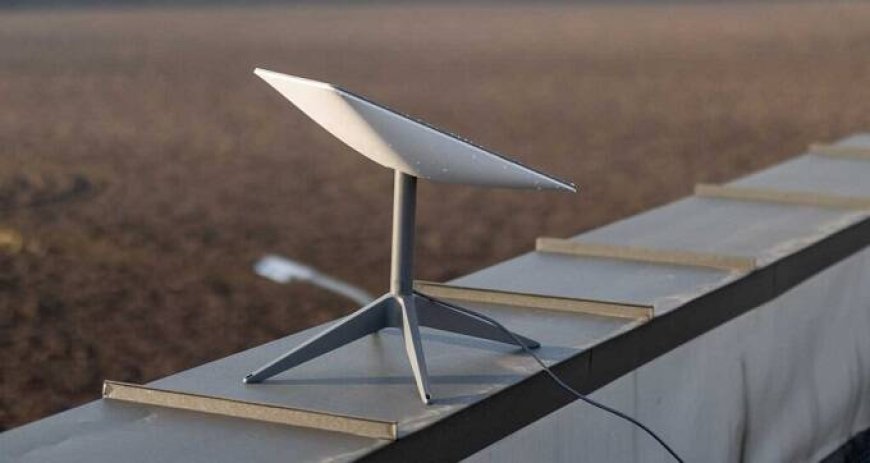Starlink Zim entry: Case of setting the cat among pigeons
Golden Sibanda THE entry of US billionaire Elon Musk’s Starlink in Zimbabwe marks the start of a potential digital age epochal era in Zimbabwe, which might see a seismic shift in the information and communication technology (ICT) space, amid expectations of spinoffs such as a drop in the cost of data and digital services. This […]


Golden Sibanda
THE entry of US billionaire Elon Musk’s Starlink in Zimbabwe marks the start of a potential digital age epochal era in Zimbabwe, which might see a seismic shift in the information and communication technology (ICT) space, amid expectations of spinoffs such as a drop in the cost of data and digital services.
This comes after the Postal and Telecommunications Regulatory Authority of Zimbabwe (Potraz) announced earlier last month that it had licensed Starlink, a low-earth orbit (LEO) internet services provider.
The company has since launched its service in about 10 other African countries, including Rwanda, Kenya, Benin, Zambia, Madagascar, South Sudan, Sierra Leone, Ghana and Botswana. Plans are afoot to roll out the service in South Africa soon. A potential game-changer, Starlink’s satellite internet service is expected to bring faster, cheaper and uninterrupted connectivity in a revolutionary manner that experts predict could redefine the future of data and digital services in the country.
In the digital era, where business is now done at the click of a button, while significant hours of people’s lives are spent online, affordable and efficient data and digital services have become indispensable. Today’s businesses cannot survive and thrive without digital services and technologies, experts say. They opine that data and digital services are now essential to stay competitive and deliver value to customers, a scenario reshaping the landscape of business and transforming how people interact across the globe.
“Every online click, social media post and e-commerce transaction generates a treasure trove of valuable information, leaving an indelible mark on the digital canvas,” says US-based technology firm Softweb Solutions.
Announcing the Government’s decision to approve the licensing of Starlink on X (formerly Twitter), President Mnangangwa said innovation, science and technology were part of the strategic pillars that anchored the Second Republic’s developmental agenda under Vision 2030. The prioritisation of the digital economy and the emerging importance of technology in day-to-day activities required the Government to lead from the front in providing an environment where investment in technology was promoted.
The President said Zimbabwe’s entire digital telecommunications space was expected to have high-speed, low-cost, LEO internet infrastructure. This includes all rural areas.
“This will be in fulfilment of my administration’s undertaking to leave no one and no place behind.”
This was corroborated by Minister of Information Communication Technology, Postal and Courier Services Mrs Tatenda Mavetera at the launch of Starlink services reseller Aura Group last week when she said the LEO satellite technology, such as the one employed by Starlink, represented a transformative opportunity for Zimbabwe’s underserved and marginalised communities.
“This will foster economic development in areas previously hindered by inadequate connectivity,” she said.
“Improved connectivity through innovative technologies like Starlink can significantly improve economic development in Zimbabwe. For instance, as rural communities gain access to reliable internet, they can overcome barriers to online learning, smart farming and telemedicine services, among others.”
Minister Mavetera pointed out that connectivity was the new oil driving economic development in many nations. Zimbabwe could only attain Vision 2030 by improving access to connectivity for all its people, she added.
Starlink’s groundbreaking technology promises to bridge the digital divide, slashing data costs and turning the tables in terms of how Zimbabweans, corporates, the Government and other institutions access information, communicate and conduct business.
With its cutting-edge constellation of LEO satellites, Starlink would bring blistering internet speeds, limited interruption and unprecedented connectivity efficiencies.
For a market previously unused to stiff competition, the question that arises is: What will be the extent of the disruption from Starlink services? Will current service providers be able to keep up pace with the new cutthroat competition?
The future of connectivity has arrived in Zimbabwe. Who is or is not ready?
ICT expert and founder of technology firm Hansole Investments Engineer Jacob Mutisi gave insightful titbits about the likely implications of the US billionaire technopreneur’s grand entry into Zimbabwe’s ICT industry.
“The entry of Starlink into Zimbabwe will have several significant impacts on Zimbabwe’s data costs and the nation’s digital services. It will increase competition in a big way. Starlink’s entry will introduce competition to existing internet service providers (ISPs). This could lead to better pricing and improved service quality, as existing companies strive to retain and attract customers,” said Engineer Mutisi, who is also the chairperson of Zimbabwe Internet Service Providers Association and the international representative of the ICT of the Zimbabwe Institution of Engineers.
“With Starlink offering satellite internet, users will see a reduction in data costs, especially in rural areas and underserved areas, where traditional infrastructure is lacking. Initial pricing will be high due to setup costs that include satellite dishes, receivers and installation, but as adoption increases, economies of scale will reduce prices.”
Eng Mutisi’s assertion was confirmed by Aura Group, one of the only two ISP entities licensed by Potraz to resell Starlink services in Zimbabwe, which indicated that its pricing structure would cut the existing cost of internet data and subscriptions by at least 50 percent.
“Our pricing structure cuts the cost of internet data and subscriptions by a minimum of 50 percent. It’s a minimum of 50 percent when you are comparing what we are selling versus what is on the market currently and what people are paying,” said group chief executive officer Mr Samuelle Dimairho.
“In some instances, you know we enable clients to make even up to 65 percent savings on existing bills; where they were paying US$1 000, they might end up paying between US$350 and US$500.If I were to give you an example, at my home, I have a 30 megabit per second (Mbps) connection and it’s unlimited and I pay US$200 per month. Now, with Starlink, those priority packages can get speeds of up to 220Mbps and if you have the high-performance kit, you can get up to speeds of 350Mbps.
“I can tell you right now that someone who has a 200 (Mbps) connection with priority in Zimbabwe is not going to pay anything less than US$10 000 per month,” Mr Dimairrho said.
Apart from lower internet service and data costs, Eng Mutisi said Starlink’s satellite coverage would provide internet connectivity to some of the remotest parts of the country, promoting inclusivity and enabling Zimbabweans to engage in the country’s digital economy.
“The users will experience faster internet speeds and more reliable connections compared to existing providers, particularly in regions that currently suffer from poor connectivity, kumamisha uko,” he said.
Connectivity for previously unserved and underserved areas, Eng Mutisi added, would stimulate the local economies, enabling e-commerce, online education and remote opportunities, which are crucial for Zimbabwe’s economic development, as it strives to achieve upper middle-income status by 2030.
“This impact will depend on how our regulatory environment adapts to accommodate new players like Starlink and potential taxes, which are way too high,” he said.
As Zimbabwe’s technology landscape shifts, Eng Mutisi said local ISPs will need to innovate and improve their products and services to compete with the US technology company and other players that may enter the space later, which would be beneficial to consumers.
He said the entry of Starlink into Zimbabwe may significantly alter the telecommunications sector, making data more accessible and affordable, while fostering financial inclusion.
Which other areas can Starlink impact?
Apart from better service quality and potential positive impact on the cost of data and digital services, Engineer Mutisi said Starlink services would likely disrupt several other areas of business and technology, beyond traditional internet access. Areas he said may be impacted include television and streaming services. Digital satellite television faces increased competition as consumers turn to more affordable streaming options.
“Starlink will provide high-speed internet service, enabling users to access international streaming platforms without the need for expensive satellite subscriptions. As Zimbabwe data costs decrease, more users will prefer on-demand content over traditional TV content, pushing providers to adapt their business models,” said Eng Mutisi.
“Traditional telecoms companies might struggle as consumers utilise internet-based communication platforms like WhatsApp and Skype that require less bandwidth and offer lower costs. With better internet connectivity, educational institutions and start-ups offering online courses may thrive, impacting traditional education models and increasing competition among learning providers.”
With high-speed internet, he said, the gaming business could experience a surge, as more players engage in online gaming and streaming services like Twitch, challenging traditional gaming consoles.
“As businesses gain better and cheaper internet access, digital marketing strategies will likely evolve, with more companies investing in online advertising, social media and influencer marketing. Enhanced internet access can boost the financial technology sector, leading to the proliferation of mobile banking and digital payment solutions, challenging traditional banking models,” he added.
Cost of data in Zimbabwe
The price of data and internet services in Zimbabwe, Engineer Mutisi said, tended to be higher than in other parts of Africa and the rest of the world.
“This is attributed to infrastructure challenges, limited competition and (challenging) economic environment. Compared to neighbouring countries like South Africa or Zambia, Zimbabwe’s data costs are often higher on a per gigabyte basis. On a global scale, Zimbabwe’s data prices are also considered high, particularly when compared to developed nations where internet access is more affordable and widespread.”
Cyber security
The Government has since put its best foot forward after Minister Mavetera indicated that the authorities had put in place measures to guard against the potential negative impacts of the new technologies.
“As a Government, we are making concerted efforts to come up with policies that regulate and guide the use and adoption of disruptive technologies that will no doubt be easily adopted with the improved connectivity that low earth orbit satellites promise,” she said.
“These policies include the Artificial Intelligence Policy, The Internet of Things Policy, and the Child Online Safety Policy. Online safety is very important as we embrace these newer technologies, with criminals now abandoning their traditional weapons for the keyboard.
“While we have promulgated the Cyber and Data Protection Act to deal with such malcontents, the saying that prevention is better than cure still rings true.
“Let us stay safe online.”
Currently, Zimbabwe has 11 million internet subscribers, reflecting a penetration rate of 73,3 percent, according to Potraz.
What's Your Reaction?








































